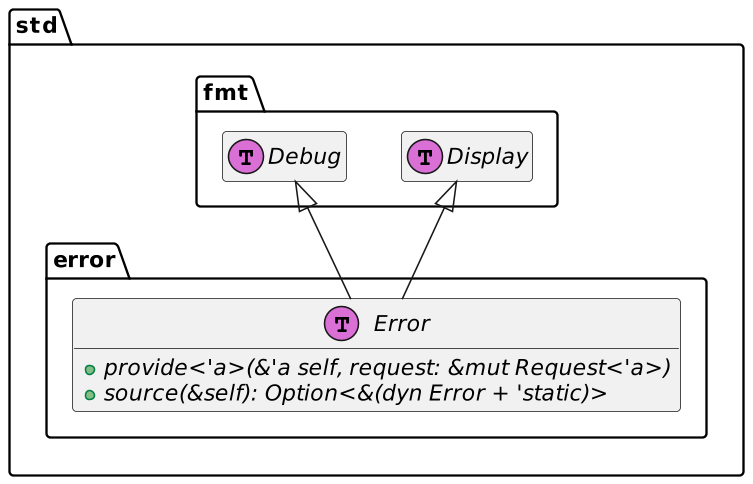As part of learning the Rust ecosystem, I dedicated the last few days to error management. Here are my findings.
Error management 101
The Rust book describes the basics of error management. The language separates between recoverable errors and unrecoverable ones.
Unrecoverable errors benefit from the panic!() macro. When Rust panics, it stops the program. Recoverable errors are much more enjoyable.
Rust uses the Either monad, which stems from Functional Programming. Opposite to exceptions in other languages, FP mandates to return a structure that may contain either the requested value or the error. The language models it as an enum with generics on each value:
#[derive(Copy, PartialEq, PartialOrd, Eq, Ord, Debug, Hash)]
pub enum Result<T, E> {
Ok(T),
Err(E),
}
Because Rust manages completeness of matches, matching on Result enforces that you handle both branches:
match fn_that_returns_a_result() {
Ok(value) => do_something_with_value(value)
Err(error) => handle_error(error)
}
If you omit one of the two branches, compilation fails.
The above code is safe if unwieldy.
But Rust offers a full-fledged API around the Result struct. The API implements the monad paradigm.
Propagating results
Propagating results and errors is one of the main micro-tasks in programming. Here's a naive way to approach it:
#[derive(Debug)]
struct Foo {}
#[derive(Debug)]
struct Bar { foo: Foo }
#[derive(Debug)]
struct MyErr {}
fn main() {
print!("{:?}", a(false));
}
fn a(error: bool) -> Result<Bar, MyErr> {
match b(error) { //1
Ok(foo) => Ok(Bar{ foo }), //2
Err(my_err) => Err(my_err) //3
}
}
fn b(error: bool) -> Result<Foo, MyErr> {
if error {
Err(MyErr {})
} else {
Ok(Foo {})
}
}
- Return a
Resultwhich contains aBaror aMyErr - If the call is successful, unwrap the
Foovalue, wrap it again, and return it - If it isn't, unwrap the error, wrap it again, and return it
The above code is a bit verbose, and because this construct is quite widespread, Rust offers the ? operator:
When applied to values of the
Result<T, E>type, it propagates errors. If the value isErr(e), then it will returnErr(From::from(e))from the enclosing function or closure. If applied toOk(x), then it will unwrap the value to evaluate tox.
We can apply it to the above a function:
fn a(error: bool) -> Result<Bar, MyErr> {
let foo = b(error)?;
Ok(Bar{ foo })
}
The Error trait
Note that Result<T, E> enforces no bound on the right type, the "error" type. However, Rust provides an Error trait.
Two widespread libraries help us manage our errors more easily. Let's detail them in turn.
Implement Error trait with thiserror
In the above section, I described how a struct could implement the Error trait. However, doing so requires quite a load of boilerplate code. The thiserror crate provides macros to write the code for us. Here's the documentation sample:
#[derive(Error, Debug)] //1
pub enum DataStoreError {
#[error("data store disconnected")] //2
Disconnect(#[from] io::Error),
#[error("the data for key `{0}` is not available")] //3
Redaction(String),
#[error("invalid header (expected {expected:?}, found {found:?})")] //4
InvalidHeader {
expected: String,
found: String,
}
}
- Base
Errormacro - Static error message
- Dynamic error message, using field index
- Dynamic error message, using field name
thiserror helps you generate your errors.
Propagate Result with anyhow
The anyhow crate offers several features:
- A custom
anyhow::Result<T>struct. I will focus on this one - A way to attach context to a function returning an
anyhow::Result<T> - Additional backtrace environment variables
- Compatibility with
thiserror - A macro to create errors on the fly
Result propagation has one major issue: functions signature across unrelated error types. The above snippet used a single enum, but in real-world projects, errors may come from different crates.
Here's an illustration:
#[derive(thiserror::Error, Debug)]
pub struct ErrorX {} //1
#[derive(thiserror::Error, Debug)]
pub struct ErrorY {} //1
fn a(flag: i8) -> Result<Foo, Box<dyn std::error::Error>> { //2
match flag {
1 => Err(ErrorX{}.into()), //3
2 => Err(ErrorY{}.into()), //3
_ => Ok(Foo{})
}
}
- Two error types, each implemented with a different
structwiththiserror - Rust needs to know the size of the return type at compile time. Because the function can return either one or the other type, we must return a fixed-sized pointer; that's the point of the
Box<dyn Error>construct. For a discussion on when to useBoxcompared to other constructs, please read this StackOverflow question. - To wrap the struct into a
Box, we rely on theinto()method
With anyhow, we can simplify the above code:
fn a(flag: i8) -> anyhow::Result<Foo> {
match flag {
1 => Err(ErrorX{}.into()),
2 => Err(ErrorY{}.into()),
_ => Ok(Foo{})
}
With the Context trait, we can improve the user experience with additional details.
The with_context() method is evaluated lazily, while the context() is evaluated eagerly.
Here's how you can use the latter:
fn a(flag: i8) -> anyhow::Result<Bar> {
let foo = b(flag).context(format!("Oopsie! {}", flag))?; //1
Ok(Bar{ foo })
}
fn b(flag: i8) -> anyhow::Result<Foo> {
match flag {
1 => Err(ErrorX{}.into()),
2 => Err(ErrorY{}.into()),
_ => Ok(Foo{})
}
}
- If the function fails, print the additional
Oopsie!error message with theflagvalue
Conclusion
Rust implements error handling via the Either monad of FP and the Result enum. Managing such code in bare Rust requires boilerplate code. The thiserror crate can easily implement the Error trait for your structs, while anyhow simplifies function and method signatures.
To go further:
- Rust error handling
- The Error trait
- anyhow crate
- thiserror crate
- What is the difference between context and with_context in anyhow?
- Error handling across different languages
- A retrospective on Errors Management: where do we go from here?
Originally published at A Java Geek on February 11th, 2024






















